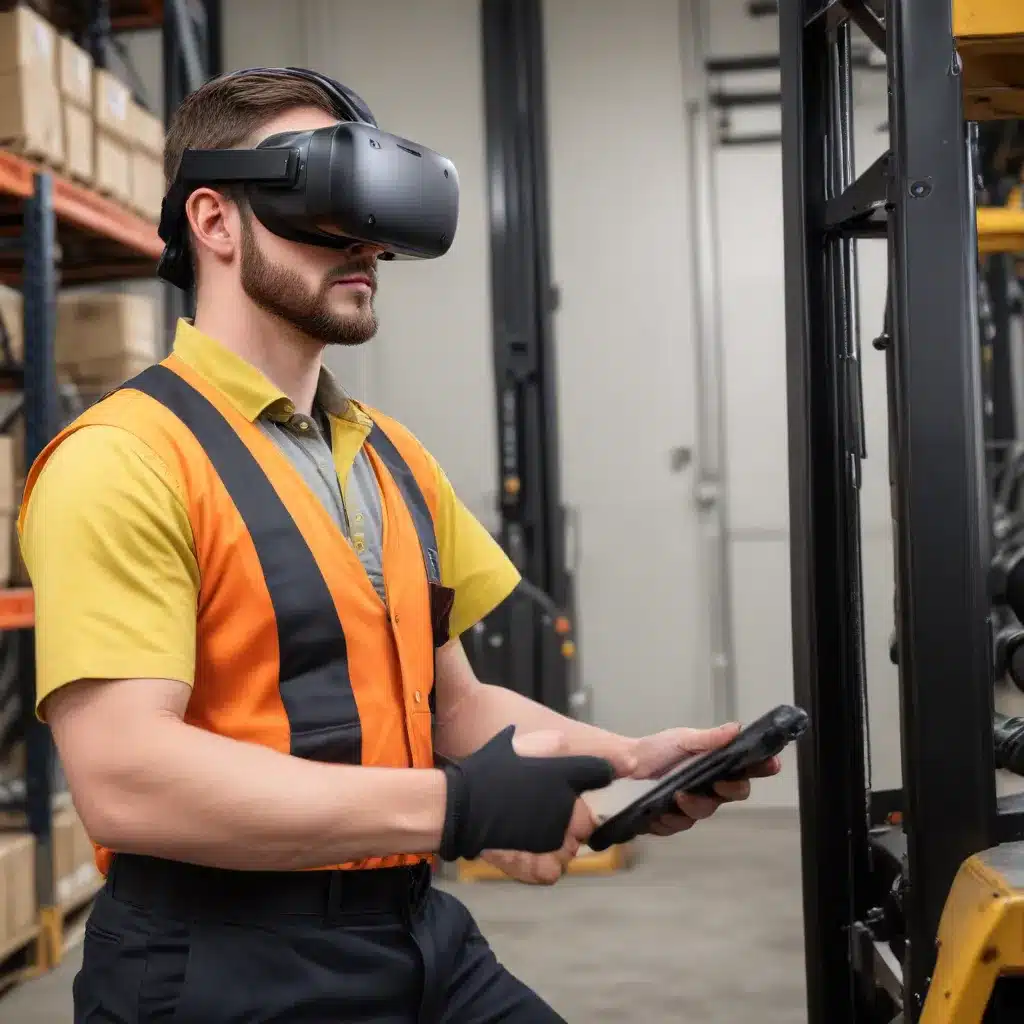
Maintaining Forklifts: The Foundation for Safe and Efficient Operations
As a seasoned industry expert in forklifts, warehousing, and logistics, I’ve witnessed firsthand the critical importance of forklift maintenance. A properly maintained forklift not only ensures the safety of operators and personnel but also enhances overall operational efficiency. In this comprehensive article, we’ll delve into the best practices for forklift maintenance and explore how the innovative application of virtual reality (VR) technology can revolutionize operator training.
Forklift Maintenance: A Proactive Approach
Regular maintenance is the cornerstone of a well-functioning forklift fleet. Implementing a structured forklift maintenance program is essential to keep your equipment in top condition and comply with industry regulations. This program should include a detailed checklist and a scheduled maintenance routine, covering daily, monthly, and annual inspections.
Daily inspections should focus on the forklift’s basic functionality, such as checks on the brakes, hydraulic systems, and safety features. Monthly maintenance should involve more thorough evaluations, including component lubrication, battery checks, and the identification of any potential issues. Annually, a comprehensive overhaul should be conducted, addressing wear and tear, replacing worn parts, and ensuring the forklift meets all safety standards.
By staying proactive with forklift maintenance, you can prevent costly breakdowns, reduce downtime, and ensure the safety of your operators and the broader workforce. Proper maintenance not only extends the lifespan of your equipment but also helps you maintain compliance with regulatory bodies, such as OSHA, which enforces strict guidelines for forklift operation and upkeep.
Embracing Virtual Reality for Operator Training
As the forklift industry evolves, so too must the approaches to operator training. Traditional classroom-based instruction and on-the-job training have their limitations, often failing to provide a fully immersive and engaging learning experience. However, the rise of virtual reality technology has opened up new frontiers in forklift operator training.
The Virtual Reality Simulator from Raymond offers a cutting-edge solution that revolutionizes the way operators learn and develop their skills. By placing trainees in a simulated warehousing environment, complete with realistic forklift models and operational scenarios, this VR-based platform provides a safe, controlled, and highly engaging training experience.
One of the key benefits of the Virtual Reality Simulator is its ability to accommodate a wide range of forklift models and operational challenges. Trainees can quickly switch between different truck types, familiarizing themselves with the unique characteristics and handling requirements of each. This versatility ensures that operators are well-prepared to navigate the diverse forklift fleet found in many modern warehouses and logistics operations.
According to Raymond, the Virtual Reality Simulator offers a range of features that enhance the training process, including:
- Over 250 Lessons: The simulator covers a comprehensive curriculum, from beginner to advanced skill sets, ensuring operators receive a thorough and progressive training experience.
- Flexible Training Options: Users can choose to train on a virtual reality “buck” or an actual forklift truck, or even switch between the two, depending on the specific needs of the organization.
- Real-time Feedback: Instructors can provide immediate feedback and guidance to trainees, helping them identify and correct any errors or unsafe behaviors.
- Gamification and Engagement: The virtual environment incorporates gamification elements, making the training process more enjoyable and engaging for operators.
By leveraging the power of virtual reality, forklift operators can develop their skills in a safe, controlled, and highly realistic environment, without the risk of damaging equipment or endangering personnel. This enhanced training approach not only improves the effectiveness of operator education but also helps organizations maintain compliance with OSHA regulations and promote a culture of safety within the workplace.
Optimizing Forklift Utilization and Productivity
Maintaining a well-functioning forklift fleet and providing comprehensive operator training are crucial steps in optimizing forklift utilization and productivity. However, the integration of advanced technologies, such as the Raymond 8610 Tow Tractor, can further enhance efficiency and throughput in warehousing and logistics operations.
The 8610 Tow Tractor is a sturdy workhorse designed to handle high-volume transport and order-picking tasks with ease. Its durable construction and energy-efficient ACR System make it well-suited for the demanding requirements of modern warehousing. Additionally, features like height-adjustable handles, standard PowerSteer, and compatibility with lithium-ion batteries help to maximize operator comfort, control, and productivity.
By incorporating the 8610 Tow Tractor into your forklift fleet, you can boost throughput and pick rates while ensuring the reliability and efficiency of your horizontal transport operations. The tow tractor’s flexibility in accommodating various tow hitch configurations and offering a wide range of operating positions further enhances its versatility and suitability for diverse warehousing and logistics applications.
Optimizing forklift utilization and productivity is not just about the equipment itself but also the integration of innovative technologies and comprehensive operator training. By combining a proactive maintenance program, the power of virtual reality-based training, and the integration of advanced forklift models like the 8610 Tow Tractor, organizations can unlock new levels of operational efficiency, safety, and compliance.
Conclusion: Embracing the Future of Forklift Operations
In the ever-evolving world of forklift operations, maintaining a well-managed fleet and a highly trained workforce are essential for success. By implementing a robust forklift maintenance program and embracing the transformative potential of virtual reality-based operator training, organizations can achieve enhanced safety, increased productivity, and greater compliance with industry regulations.
As an industry expert, I encourage you to explore the possibilities offered by technologies like the Virtual Reality Simulator and the Raymond 8610 Tow Tractor. By investing in the future of forklift operations, you can position your organization for long-term success, deliver exceptional value to your customers, and create a safer, more efficient workplace for your employees.
To learn more about the latest advancements in forklift technology and operator training, be sure to visit Forklift Reviews, your go-to resource for industry insights and practical solutions.

